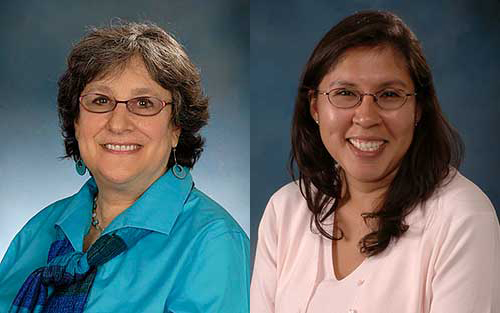UM School of Medicine Co-Led Novavax Vaccine Trial
The Centers for Disease Control and Prevention (CDC) this week recommended a new COVID-19 protein-based vaccine as an option for primary vaccination of adults age 18 and older. The University of Maryland School of Medicine’s (UMSOM) Karen Kotloff, MD, professor of pediatrics, medicine, epidemiology, and public health, co-led the multi-center PREVENT-19 clinical trial, which studied safety and efficacy of the Novavax vaccine in about 30,000 adult study participants.
Kotloff is principal investigator of the Vaccine Treatment and Evaluation Unit (VTEU) at UMSOM, part of the University of Maryland, Baltimore (UMB), which is among the institutions included in the COVID-19 Prevention Network (CoVPN). Funders of the national trial include the National Institute of Allergy and Infectious Diseases (NIAID), part of the National Institutes of Health (NIH), and the Biomedical Advanced Research and Development Authority, part of the U.S. Department of Health and Human Services Office of the Assistant Secretary for Preparedness and Response.

Karen Kotloff, MD, and Milagritos D. Tapia, MD
The results of the trial, published in the The New England Journal of Medicine, showed that the Novavax COVID-19 vaccine demonstrated 90.4 percent efficacy against COVID-19 infection and prevented 100 percent of severe disease. The trial was conducted in the United States and Mexico between Dec. 27, 2020, and Feb. 18, 2021, before the Omicron variant became dominant.
“Adults in the U.S. will now have access to a protein-based COVID-19 vaccine backed by data that has demonstrated efficacy, safety, and tolerability,” said Kotloff, who also is head of the Division of Pediatric Infectious Disease and associate director of Clinical Studies at UMSOM’s Center for Vaccine Development and Global Health (CVD). “Offering more vaccine technologies and options in our vaccination portfolio, including those successfully used for years in widely available vaccines, will hopefully help increase our country’s vaccination rate. In addition, its simplified storage and transport requirements will satisfy global needs.”
In 18- to 64-year-old study participants, 57.9 percent had local reactions at the injection site after the first dose, and 78.9 percent had local reactions after the second dose. The most common reaction among study participants following vaccination was pain or tenderness. Systemic reactions, such as fatigue or malaise, were seen in 47.5 percent of participants after dose 1 and in 69.3 percent after dose 2. Fewer than 7 percent of study participants had a fever. Reactions were less common in participants 65 years and older. Most reactions were mild or moderate and resolved within a few days.
The U.S. Food and Drug Administration issued an Emergency Use Authorization of the Novavax COVID-19 Vaccine, Adjuvanted for Individuals Aged 18 and Over on July 13. The Biden administration said it plans to buy 3.2 million doses of the Novavax vaccine for distribution throughout the United States.
Experts say they hope the availability of a protein-based vaccine that uses older technology may encourage those who are not yet vaccinated to do so now. The Novavax vaccine works similarly to vaccines for HPV, shingles, diphtheria, tetanus, and pertussis.
“The technology used to make the Novavax vaccine is similar to the process used to create the several other well-known vaccines that have been overwhelmingly safely tolerated for decades,” said the current Novavax UMSOM principal investigator Milagritos Tapia, MD, professor of pediatrics and medicine. “We still have a vaccine hesitancy problem in the United States, and we hope that educating the unvaccinated about their new vaccination option may encourage them to change their minds.” Elizabeth A. D. Hammershaimb, MD, postdoctoral fellow at UMSOM, and other CVD experts assisted Tapia with this trial.
The difference between COVID-19 vaccines that previously received emergency authorization and the newly authorized vaccine made by Maryland-based Novavax is simple: The Pfizer and Moderna mRNA vaccines prompt the person’s own cells to make spike proteins that result in an immune response. The Novavax vaccine injects the spike protein directly into the person’s body.
“Dr. Kotloff’s leadership of the PREVENT-19 multi-center trial investigating the Novavax COVID-19 vaccine, along with her team’s oversight of the CVD’s local Novavax site, helped us reach this important step in our response to the pandemic,” said E. Albert Reece, MD, PhD, MBA, executive vice president for medical affairs, UMB, and the John Z. and Akiko K. Bowers Distinguished Professor and dean at UMSOM. “The distribution of Novavax vaccines across the U.S. offers Americans much-needed options to achieve as much protection as possible against severe illness, hospitalization, and death.”
This research is funded by NIAID to the UMSOM at UMB, Implementing VTEU Clinical Site, Grant number UM1AI148689. CoVPN was formed by NIAID at NIH to respond to the global pandemic. Through the CoVPN, NIAID is leveraging the infectious disease expertise of its existing research networks and global partners to address the pressing need for vaccines and antibodies against SARS-CoV-2. CoVPN will work to develop and conduct studies to ensure rapid and thorough evaluation of vaccines and antibodies for the prevention of COVID-19. The CoVPN is headquartered at the Fred Hutchinson Cancer Research Center.



